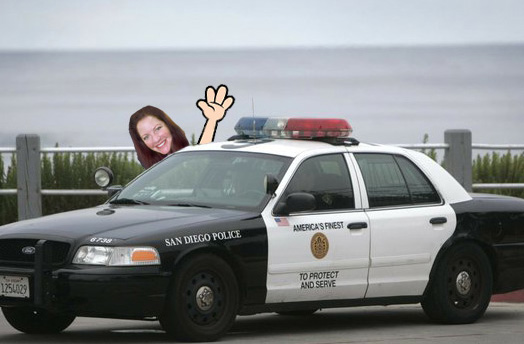 So I was in a patrol car for the first time the other day—no, no, I wasn’t in trouble! We have a friend, colleague and LET-trained police sergeant who works nearby and I asked him if I could do a “ride along” and he said “Sure!” so off we went for a few hours last week. Besides learning ALL that they do (which is a lot), how much territory they cover on their shift (which is a lot), and what the world looks like when you’re in a patrol car, I got to learn about how the LET skills help this police supervisor out on a daily basis. He has a naturally helpful, easy-going personality but I noticed his empathy and caring with his team, who reports to him, ending every interaction with a Direct Report with a, “Do you need anything?” And he often checked for clarity to make sure he understood the situation.
So I was in a patrol car for the first time the other day—no, no, I wasn’t in trouble! We have a friend, colleague and LET-trained police sergeant who works nearby and I asked him if I could do a “ride along” and he said “Sure!” so off we went for a few hours last week. Besides learning ALL that they do (which is a lot), how much territory they cover on their shift (which is a lot), and what the world looks like when you’re in a patrol car, I got to learn about how the LET skills help this police supervisor out on a daily basis. He has a naturally helpful, easy-going personality but I noticed his empathy and caring with his team, who reports to him, ending every interaction with a Direct Report with a, “Do you need anything?” And he often checked for clarity to make sure he understood the situation.
What struck me the most was hearing what helped him the most in crisis situations on duty. Anyone care to guess what that is?
Here’s what he said:
“Listening. That’s what I do the most to help people calm down in a heated situation and it works. It’s saved me stress, helps potential dangerous situations transition into calm, manageable ones and has, I am sure, saved lives.” He told me of a story of a homeless woman who had been living in her makeshift home for about 6-7 years, next to the train tracks. The railroad needed access to her space to widen the track. When the railroad staff approached her, she pulled out her rifle and fired a round toward the embankment….and so yeah, they then notified the police. So my officer friend was called onto the scene. He couldn’t see her through the thick brush but knew she was armed, so the two-way dialogue started and he began acknowledging how upset she must be that her home was being threatened, that she was angry and worried, and he listened to her for quite a while.
Time was on his side, so the listening continued. She calmed down, put down her weapon, and they were able to engage in peaceful communication and problem-solve together. He knew that if he had pushed her, showed more force and more importantly if he hadn’t taken the time to listen to her, to acknowledge where she was at, as they say, that entire situation could have taken a very dangerous and potentially fatal direction.
This is just one incident, he said, of many where listening has enabled a peaceful resolution to occur while on duty. I have always had a tremendous amount of respect for those who put themselves in harm’s way to protect others. I am humbled by what they do for us all. I have a deeper appreciation of this job now—it was a great experience. I do have one criticism however–I didn’t get to turn on the siren—maybe next time.

